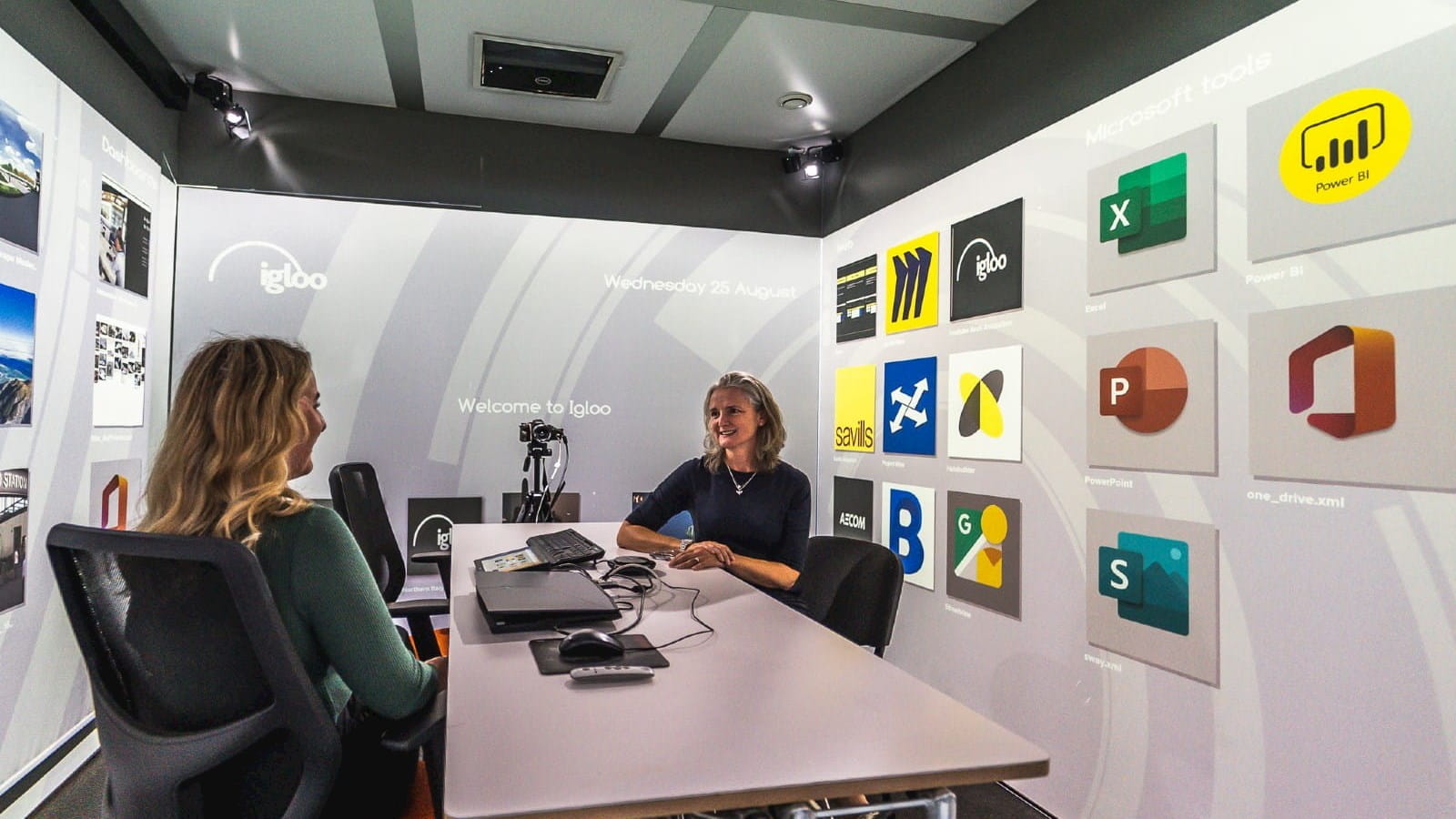
In June 2021, Igloo Vision was included as one of 21 companies to watch in the UK Immersive Tech: Venture Capital Investment Report. Kerry Head, Igloo Vision’s Managing Director, shares how the company has financed growing from its Shropshire roots to opening offices in the US, Canada and Australia.
Picture an immersive virtual learning space with 360° projection and the ability to simulate training. It could also be a collaborative workspace, a meeting room where you can stream different types of content and connect remote teams, an exhibition space with wraparound vision and sound, or a 360° 3D visualisation of a construction design. These are some of the ways in which Igloo Vision’s immersive products and software can be applied.
Originating out of the UK festival scene in 2007, the company now has clients spanning sectors such as engineering, real estate, technology, energy, retail, education and healthcare. From an initial base in Craven Arms, Shropshire, Igloo Vision has expanded with offices in London, New York, Los Angeles, Toronto and Melbourne, as well as opening a demo centre in Rotterdam in 2021.
Frugal beginnings
Igloo Vision’s journey started with minimal funding – an experience that many entrepreneurs will be able to relate to. “A couple of angel investors, local Shropshire people that the founders knew through different connections, lent them about £50,000 to buy their first set of projectors,” explains Kerry Head, Igloo Vision’s Managing Director. A couple of credit cards and off they went, she adds, launching their first event at Glastonbury.
Besides seed investment, these angel investors also provided mentorship and helped with the business’s direction. They have remained committed to Igloo and currently serve as Board members.
By 2010, the company’s growing corporate client base included Sky, which used two of Igloo Vision’s dome structures as entertainment areas in London and Birmingham for the Sky Ride cycling events. Meanwhile Toyota used Igloo Vision’s projection mapping technology to launch its new Toyota Auris that same year.
Funding mix to support growth
As Igloo Vision continued to expand its clients, it secured £255,000 in venture capital finance from the Midven Exceed Partnership Fund in 2011. Two further tranches of funding from Midven followed in 2013 and 2015, recalls Head, a chartered accountant and chartered financial analyst who first joined Igloo Vision as Finance Director in 2017. “By the time I joined, Igloo Vision had achieved around £650,000 of funding through the Midven Exceed Partnership and angel investors,” she says.
The UK’s enterprise investment scheme (EIS), which can provide tax reliefs to investors, is another way in which qualifying businesses can look to support finance raising, with Igloo Vision also making use of it from 2018 “We started doing it on a really budget basis of gathering a few emails together and making sure we had EIS exemption. Fundraising with friends, acquaintances, and friends of friends,” says Head.
She adds: “We’re not a typical model because we are software plus hardware, so we’re a slightly harder pitch. But because we had a good track record and we’ve got great corporate clients, we got enough interest to close the full round in that year on about £598,000 EIS.”
Head highlights the importance of developing relationships and looking at the different funding options available. “A lot of the traditional lenders won’t lend to us,” she says. “You have to meet so many different investors before you find some that will invest in you.”
At one point, Head says, the company took out a loan from a short-term financing company. “We paid it all back and it got us over the next bump. While doing our EIS fundraise, we had that cash flow coming in. You have to be pretty flexible.”
There is also a lot of complexity you have to deal with when you’re a small firm, adds Head, such as reviewing shareholder agreements following fundraising efforts, classifying for example who is a major shareholder, an investor and employee shareholder.
In 2019, Igloo Vision started talking to a Birmingham-based fund called Frontier Development Capital, which Head had met at an exhibition. This resulted in a £1m non-EIS investment that was half debt and half equity. “They’re now one of our major investors,” says Head.
Frontier Development Capital provided further investment during a fundraising round in 2020 along with other existing Midlands-based investors and a London-based fund manager Mariana UFP LLP. Igloo Vision secured £435,000 during this funding round under the EIS scheme.
That same year, the Infrastructure Venture EIS Service of London-based Ingenious Group invested £787,000. At the time of the equity investment in November 2020, Dennis Wright, one of the original angel investors, said: “This investment, along with the ongoing increase in the valuation of Igloo, is a reflection of the significant progress we’ve made, irrespective of a global pandemic and recession. Sales have remained buoyant and we have been able to penetrate new geographies, with Igloo technology now used in 39 countries.”
Amid COVID, Igloo Vision also made use of government support packages such as the furlough scheme and the Coronavirus Business Interruption Loan Scheme (CBILS). Head says: “Those [support measures] helped because what we wanted to make sure of is that we had enough cash so that when we came out of COVID we were ready for our growth trajectory.”
Most recently, in 2021, Frontier Development Capital’s Debt Fund provided another £2.75m to Igloo Vision.
Looking ahead
What’s next for Igloo Vision? “We’ve got big growth plans,” confirms Head. “Where we want to go next is more US offices. Atlanta will be the next location with a new office opening in September. We’re thinking about Seattle, Houston and Chicago. The US seems to adopt this technology quicker than other areas. We’re also interested in partnerships with people. If they’ve got a demo space and they want to partner with us, we’re open to those kinds of suggestions as well.”
The next challenge will be funding the growth, says Head, who expects that there will be another fundraise in the next 12-18 months. For this next round, the company will be looking for venture capital equity financing. “It’s exciting,” says Head. “We feel strong as a management team and we know that we’ve got a great proposition.”
Eyeing the future, Head adds: “We want to be the global leader in immersive space technology, generating sustainable profits and creating real value for our clients, shareholders and employees. And we think it’s possible because the market is huge – our technology can be used by any organisation, anywhere.
“We’re really confident. We’ve got great clients that are asking for repeat business. The quality of our clients, and the fact that they’re choosing Igloo technology for their workspaces, that makes us very proud.”
Insights Special: Access to finance
ICAEW Insights examines the finance options and support available to businesses, as well as the challenges they face in obtaining it.




